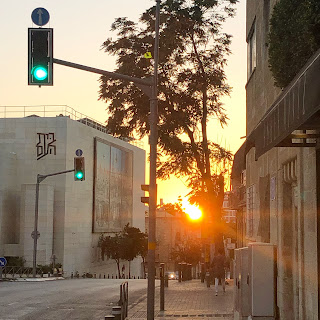FILM REVIEW: THE IRAN JOB
Intimate,
quiet, lyrical, and extremely powerful - the documentary The Iran Job is all of
the above. Recently, this independently produced film portraying an American
basketball player’s season with a club in Iran filled one of the theatres at
the IFC Center for nearly three weeks, until Hurricane Sandy brought life in Lower
Manhattan to a temporary halt.
The great
success among the public speaks for the documentary’s importance and validity
and its brilliant, entertaining storytelling. Detailed and calm observations of
human encounters, spontaneous moments that are allowed to breathe and unfold on
screen, and an outwardly neutral yet sharp-eyed political perspective make this
documentary debut an astounding one.
Filmmaker
Till Schauder produced the documentary together with his Iranian-American wife
Sara Nodjoumi. He followed Kevin Sheppard, at the time a 29-year old basketball
player from the US Virgin Islands, to the Iranian city of Shiraz, where Kevin
was under contract at the local club A.S. Shiraz for the 2008-2009 season. He
was hired to lead the newcomer team in the Iranian Super League to the playoffs,
and possibly to the championship. Kevin’s Iran job is helping the club “get a
W,” a slang expression he teaches his teammates. Watching him as he struggles
to meet this goal is the main axis of the narration.
Yet there
are many more axes: the axis of adaption to a foreign culture, the axis of
friendship, the axis of personal development, the axis of political upheaval -
all of which carry the film well beyond the category of a mere sports
documentary.
The
strongest axis may be the gradually evolving friendship that Kevin and his
Serbian roommate, A.S. Shiraz’s other legionnaire, build with three young women:
Hilda, who works for the team’s physiotherapist, and her friends Laleh, and
Elaheh. The interaction between Kevin and the women brings to the fore many of
the aspects that are inherent to an intercultural dialogue: curiosity and
incomprehension, warmth and laughter, speechlessness and embarrassment, growing
confidence and eventual understanding.
The
season 2008-2009 was exciting and challenging, not only for the A.S. Shiraz,
but also for the political relations between Iran and the United States. Kevin
leaves for a country that is declared “evil” by then President George W. Bush.
Discussions about Iran’s nuclear program constantly fill the news. Posters and
paintings on the streets in Iran against the “devil United States” are
ubiquitous. Barack Obama is elected and inaugurated. Elections take place in
Iran, the protests against the results that confirm Mahmoud Ahmadinejad in
power lead to the Green Movement, ultimately a precursor of the Arab Spring.
And in
the midst of all this, a happy-go-lucky guy from the US Virgin Islands, who,
towards the end of the film, will state that “this thing
right here is bigger than basketball.“
After his season in Shiraz, Sheppard returned home,
married his girlfriend, fathered a child, and returned to Tehran’s Azad
University club for another basketball season in Iran.
The film is also a courageous and proud film. Most
striking, again, are the three women, Hilda, Laleh, and Elaheh. Allowing to be
filmed while they visit the boys’ apartment, take off their scarves, ride together
with their male friends in a car and share, on cam, critical thoughts about the
government could well have sent them to jail. In the Q&As after the
screening, Schauder said that in the meantime, two of the women had left the
country. He also mentioned that the film might be shown at the Tehran Film
Festival next year, expressing his hopes that this might be a sign that the
film will encounter benevolent audiences there.
Courageous, too, is the way Schauder and Nodjoumi
produced the film. Without a journalist visa but with a German passport, the
German-American Schauder entered Iran with nothing more than what could be
declared a tourist’s video equipment, if need be when stopped on the streets
and questioned: an HDV camera, wireless mics, and presumably a small tripod.
What he achieved to capture aesthetically within these
limits is great. There are some beautiful and expressive images of the cities
and landscapes, when the friends visit the old capital Persepolis, or when the
Serbian roommate is sitting in the shadowy lobby and his silhouette is
reflected on the floor, or when Kevin visits the local market in Shiraz and
bonds with old Iranians who sustain that they “love black people.”
Now, the courage of this film is being rewarded. In two
extremely successful Kickstarter campaigns, Schauder and Nodjoumi raised more
then 100.000 dollars for the production of the film and 66.000 dollars for its
distribution. Everyone who is able to and wants to make the effort can bring The
Iran Job to a local theater. Just get in touch with the filmmakers by checking
out www.theiranjob.com
This is independent filmmaking at its best and for me,
it truly “got a W.”



Comments